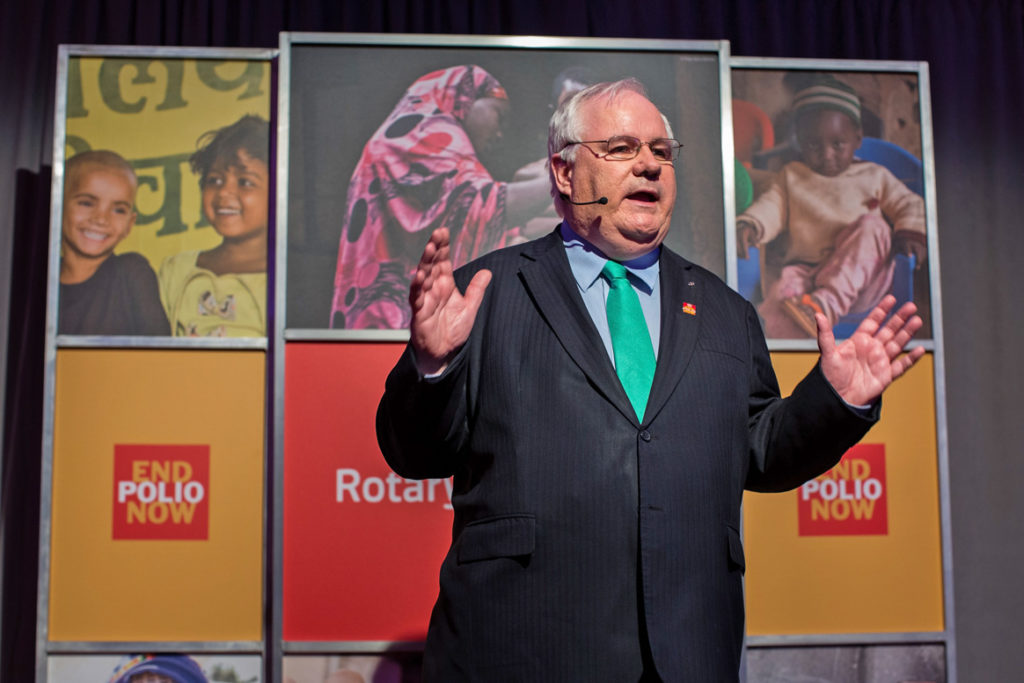Rotary is giving $100 million in grants to support the global effort to end polio, a vaccine-preventable disease that once paralysed hundreds of thousands of children each year.

The funding comes as Rotary and its partners in the Global Polio Eradication Initiative (GPEI) address the final and most pressing challenges to ending poliovirus transmission, and as Nigeria approaches three years without any reported cases of wild poliovirus, bringing the Africa region closer to polio-free status.
“We have the wild poliovirus cornered in the smallest geographic area in history, and now there are just two countries that continue to report cases of the wild virus,” said Michael K McGovern, chair of Rotary’s International PolioPlus Committee.
“As we work with our partners to apply innovative new strategies to reach more children, and embrace lessons learned thus far, Rotary is doubling down on our commitment to end polio for good. I’m optimistic that the end of polio is within our grasp, but we must remain vigilant in rallying global political and financial support as we push towards a polio-free world.”
While there were only 33 cases of wild poliovirus reported in 2018, the last mile of eradication has proven to be the most difficult.
Barriers to eradication — like weak health systems, insecurity, and mobile and remote populations — must be overcome.
As long as a single child has polio, all children are at risk, which underscores the need for continued funding and commitment to eradication.
To support polio eradication efforts in endemic countries, Rotary is allocating half the funds it announced today to: Afghanistan ($16.3 million), Nigeria ($10.2 million), and Pakistan ($25.2million). Additional funding will support efforts to keep vulnerable countries polio-free:
Chad ($102,395)
Democratic Republic of the Congo ($9.5 million)
Ethiopia ($2.6 million)
Iraq ($6 million)
Kenya ($6.3 million)
Mali ($1.2 million)
Somalia ($1.4 million)
South Sudan ($1.2 million)
Syria ($1.7 million)
Yemen ($2.1 million)
The World Health Organisation (WHO) will receive $1.3 million to conduct research, and will also receive support for surveillance activities in its Africa ($10.9 million) and Eastern Mediterranean ($4 million) Regions.
Rotary has committed to raising $50 million a year to be matched 2-to-1 by the Bill and Melinda Gates Foundation, amounting to $150 million for polio eradication annually.
Rotary has contributed more than $1.9 billion to fight the disease, including matching funds from the Gates Foundation, and countless volunteer hours since launching its polio eradication programme, PolioPlus, in 1985.
In 1988, Rotary became a spearheading partner in the Global Polio Eradication Initiative with the WHO, UNICEF, and the US Centers for Disease Control and Prevention.
The Gates Foundation later joined. Since the initiative launched, the incidence of polio has plummeted by more than 99.9 percent, from about 350,000 cases in 1988 to 33 cases of wild poliovirus in 2018.
Rotary brings together a global network of volunteer leaders dedicated to tackling the world’s most pressing humanitarian challenges.
It connects 1.2 million members from more than 35,000 Rotary clubs in almost every country in the world.
Their service improves lives both locally and internationally, from helping those in need in their own communities to working toward a polio-free world.
Source: rotary.org





